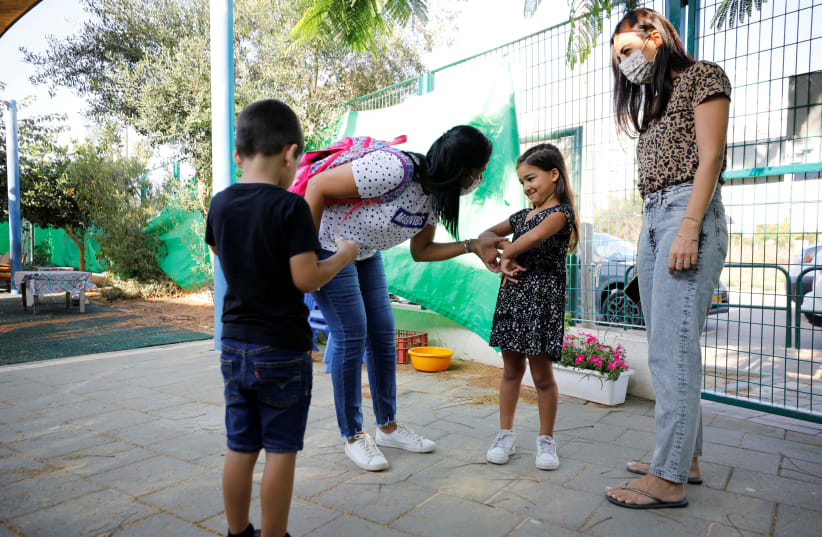Israeli youth will return to their “normal” routines on Sunday and the public will no longer have to wear masks outdoors.
The Education Ministry published on Friday the framework for returning to “normal” full-time schooling on Sunday. Studies will resume six days per week without capsules – and with no restriction on the movement of teachers, aides or students.
Supplementary education classes, such as support for new immigrants, will also return in full, as will after-school programs available for youth in preschools through third grade.
The opening will be done under a stricter intervention model for dealing with outbreaks – the “Adjusted” Defending Education program – allowing for wide monitoring and prevention of spread.
Schools will still be required to adhere to Health Ministry guidelines, such as wearing masks, adhering to personal hygiene, ventilating classrooms, and keeping as much distance as possible during breaks and when gathering in common areas.
Students will no longer be required to wear masks in open spaces, while eating or during gym class.
Similarly, the Health Ministry announced last Thursday that masks will no longer be required by the general public in open spaces where there are not large crowds, and also not in one’s own personal living space.
“It should be emphasized that in non-open areas, a mask should be worn,” the ministry stressed Saturday night in a statement, asking citizens to keep masks with them “every time you leave the house” as masks will still be required in closed spaces.
Back to schools: They will now be able to hold day trips. Army preparation courses for students in grades 11-12 can take place with up to 100 students and staff members in open areas. School transportation, such as special busing programs, can commence.
In order to help reduce emotional, social and learning gaps, middle and upper school principals can decide to set up a flexible learning program that can include individual, group or integrated learning – inside or outside. Digital distance learning can still take place at a rate of up to 20% of the weekly study hours or up to a weekly learning day.
Additionally, education assistants whose service was expanded will continue to work in primary schools as they have done so far, in an attempt to reduce the gaps that have been created.
WHILE THE aim is to resume full-time learning across the country on Sunday, if schools need more time to prepare, they have until April 25 to complete their transitions back to normal schooling.
At this stage, however, the non-formal education system and the higher education system will continue to operate in the existing format.
“The long-awaited return to full-time learning evokes a range of emotions among students, staff and parents,” the Education Ministry wrote in a letter that included the new framework on Friday. “On the one hand, everyone has been longing for routine and a sense of security and stability. On the other hand, a return to routine is accompanied by a fear of gaps that have been created, of distance or even alienation.
“The fear of the coronavirus, which has not yet left the world, also hovers from above,” the message continued. “It is important to allow everyone time to adapt.”
The ministry recommended that space be offered to students and staff to express complex emotions, adding that it is important for all parties to be supportive during this period of transition.
It added that schools should consider classroom and personal dialogues with students about their emotions, plan classroom social time to reacquaint students and, of course, provide maximum academic assistance for each student.
Last week, a report by the Education Ministry was released showing that there has been a 30% decrease in basic skills among first- through third-graders, and a similar gap of about 30% has developed in the core subjects, such as math and English, among students in grades 7-10.
Students have decreased motor and physical skills as well, and school counselors reported that a third of students were suffering from emotional distress and that there is a 25% increase in risk assessments for suicide by educational psychologists.
A separate survey, conducted by Prof. Michal Grinstein-Weiss of Washington University and the Interdisciplinary Center Herzliya together with Prof. Rami Benvenisti of Hebrew University, showed that one in five children are suffering from symptoms of anxiety.
In addition, nearly half of children (46%) need psychological help as a result of the coronavirus crisis.
